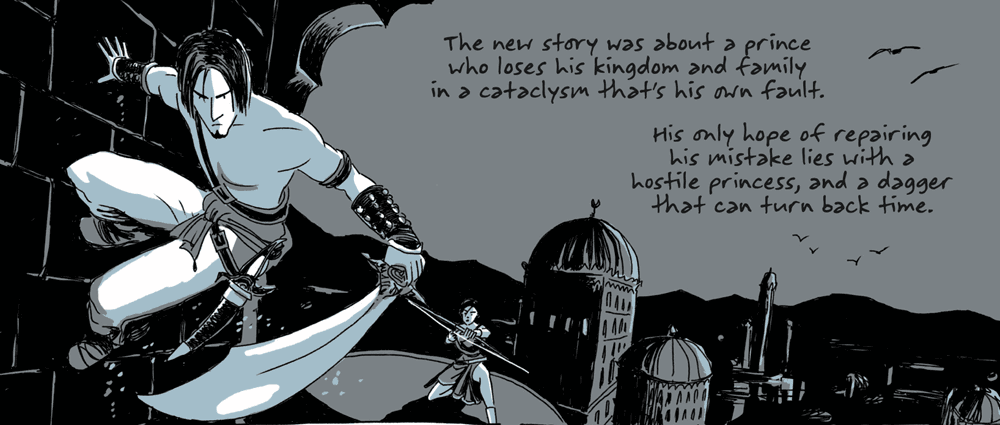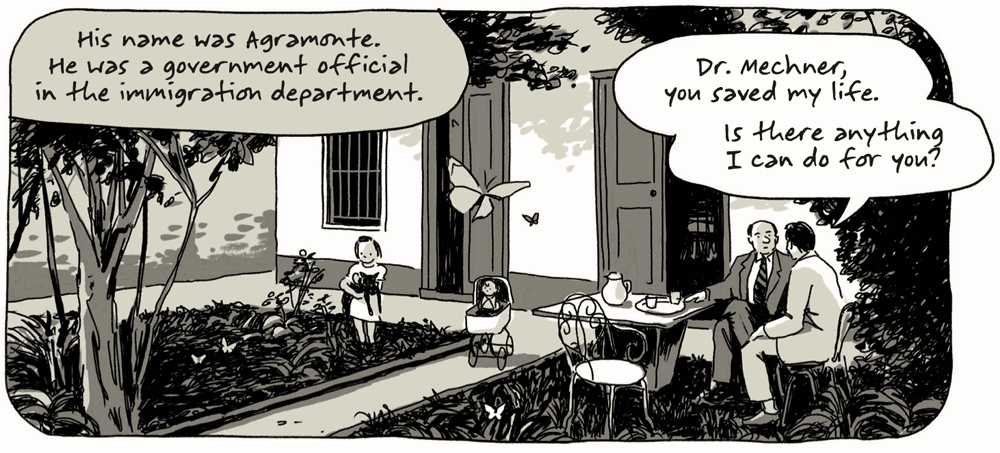Replay: Memoir of an Uprooted Family review
Replay: Memoir of an Uprooted Family by Jordan Mechner is a genuinely cool use of the comic book/manga format. This book tells the Mechner family history as a graphic novel memoir.
I had read an excellent graphic history book a while back—called Trinity: A Graphic History of the First Atomic Bomb by Jonathan Fetter-Vorm—which I’d meant to write a review for, but never did. It had struck me then that we generally don’t utilize the comic book/manga format for nearly as many genres/uses as we could. We have an extremely dynamic and expressive visual medium here, and it largely gets relegated to superheroes and science fiction (at least in the west). Let’s get the word out: Comics can do nonfiction too!
Prince of Persia: The Sands of Time - still a timeless classic!
I have become a pretty huge fan of Jordan Mechner. The original Prince of Persia was obviously a great game, revolutionary for its time. And the series reboot, The Sands of Time, was such an absolute masterpiece, it remains one of my all-time favorite games to this day. But even if you weren’t a fan after those achievements, Digital Eclipse’s interactive documentary The Making of Karateka would surely win anyone over to Team Mechner. That documentary’s insights into a young developer’s life, with all the journal entries, development documentation and videos, interviews, written correspondence, and so on, made it simply impossible not to root for Jordan in all his artistic endeavors.
Replay is especially ambitious in that its overarching story is multigenerational. You have Jordan’s life as a video game developer in the modern day—meaning the 2010’s, but also flashbacks to the 1980’s, and some in the 90’s as well. You have (Jordan’s father) Francis Mechner’s stories of growing up in France while evading Nazi advances during WWII. And then you have (Jordan’s grandfather) Adolf Mechner’s stories of fighting in World World I, before escaping Europe on the verge of WWII. The book jumps between narrative time periods, using Jordan’s modern life as the primary vantage point, but delving into generational tales (from Adolf and Francis’s past) fairly frequently.
The format is particularly interesting because gravity and stakes presented in these different stories can vary wildly. Truly harrowing tales of narrow survival in wartime or outmaneuvering Nazi gestapo gets juxtaposed with, for example, the banalities of getting a video game project funded, or weighing the pros & cons of moving to France. And the results can be fairly jarring. It goes without saying that most anyone’s day-to-day life from 2015 or 2018 simply will not compare with the horrors of WWI and WWII in terms of dramatic impact. Still, Jordan portrays a lot about his home life, including a candid look into his marriage which was crumbling at the time. The vulnerability of sharing sensitive personal struggles is admirable, however the emotional resonance of world-changing events 100-ish years ago is bound to land harder than anything that occurred in the past decade or so.
To Mechner’s credit, I think he does an impressive job of weaving the drama (and trauma) of the historic past into his own modern-day life. As Jordan works to preserve his family history in the present, he turns up new details, which makes for a natural transition point to flashback into the past. And through a clever standard of coloring his comic panels, you always know what time period is being portrayed. It’s very nicely done.
The art itself is impressively good-looking and shockingly cohesive, especially given that the level of detail in each panel can vary quite a bit. When the seriousness of a subject calls for more clarity, Mechner includes more intricate details. When the subject matter is lighter or more casual, he dials it back. Personally I’m just blown away by the level of clarity he managed to achieve. At 300+ pages, this would be a pretty huge project for any artist, but Replay is also the first book which Mechner wrote and illustrated himself.
For those primarily interested in video game history, or insightful memoirs by famous video game developers, I would not necessarily recommend Replay. Even if you’re interested in Jordan Mechner in particular, the aforementioned Making of Karateka game is actually a much better resource for video game historians. However, if your interests lie more in (capital-H) History, then this graphic memoir is definitely for you. Anyone interested in the Austro-Hungarian Empire, or the Jewish diaspora in 1900’s Europe, or those just fascinated by WWI and WWII—well congrats, this book is for you.
Which is not to say that fans of video game history, or of Jordan Mechner’s games, will not enjoy this book—I was certainly enthralled! But in my opinion, the video game stuff is fairly slight, and obviously not the main focus of this book. If you’re coming in looking for insights into Mechnar’s game development process, you might be disappointed. On the other hand, if you are open to learning how the Mechner family came from Vienna, through France and Cuba, to eventually settle in New York—only for Jordan to move to France decades later—then you are likely to have a good time.
Quite a few moments from this family history really got to me, particularly the stories of Lisa and Francis on the run in France. Details of people getting left stranded in Nazi occupied territories due to bureaucratic red tape, postal delays, or just laziness on the part of visa clerks was extremely sad…and it felt eerily relevant to the present day all the sudden. The book is full of moments of incredible generosity—also moments of unbelievable cruelty—and these stories will stick with me for a long time.
Francis Mechner is a treasure! He’s always my favorite character in anything in which he appears.
Now if you read Replay and, like me, you find yourself wanting to know more about specific people or moments from the book, Jordan actually created an online resource for additional notes and documentation. The Replay Annex contains a ton of added information, pictures, and behind-the-scenes commentary from the creator on his process, all nicely organized by book chapter. It’s absolutely incredible, so if you read the book, definitely check it out.
Replay by Jordan Mechner is a poignant story of one family’s journey across the generations and across the world. The book’s appeal is much more in the history told than the video game insights divulged. However, even if that were a surprise for you, the final product is so epic and impressive, you absolutely will not care. Highly recommended.







